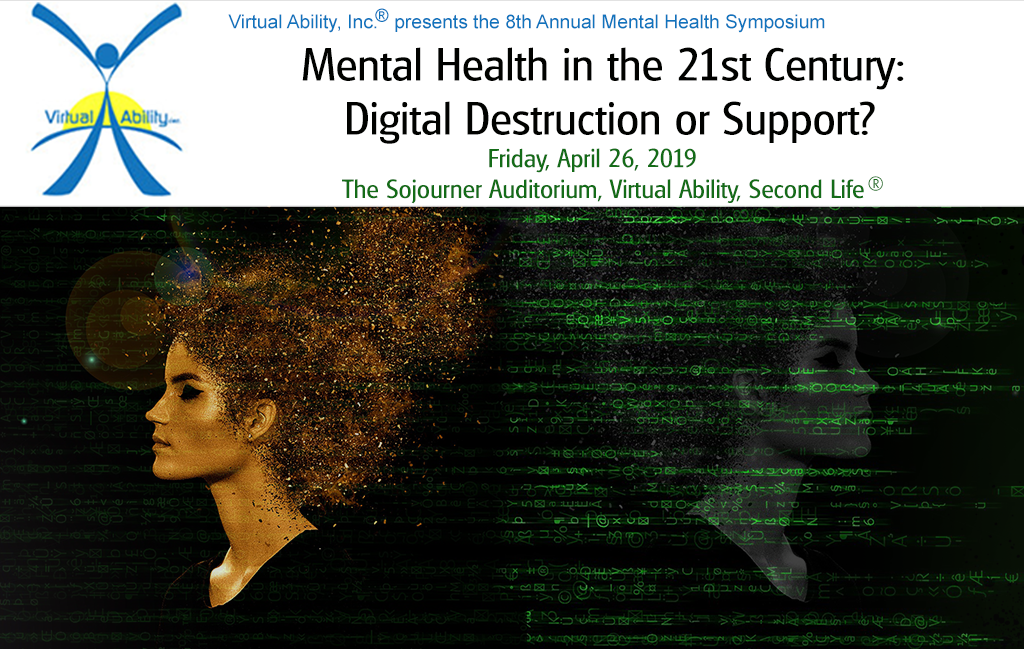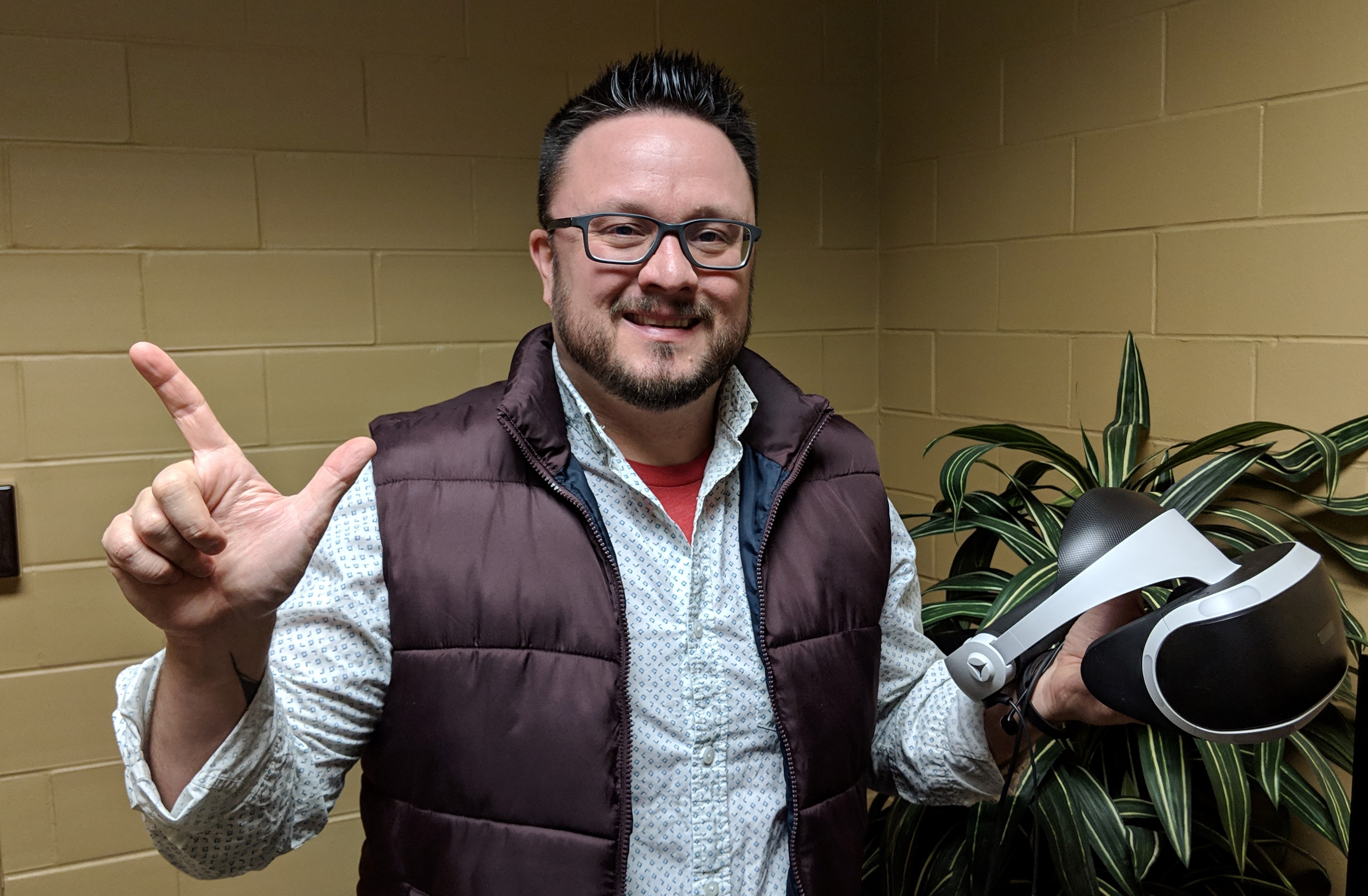
Please join the Virtual Ability community in Second Life for the eighth annual Mental Health Symposium. It will be held on Friday, April 26, 2019. There is no charge to attend.
The theme of this Symposium is “Mental Health in the 21st Century: Digital Destruction or Support?” Our international group of presenters will offer a wide interpretation of the theme, based on their interests and academic backgrounds.
The Symposium will take place in Virtual Ability’s Sojourner Auditorium, on Virtual Ability island. The SLURL for the auditorium is: Sojourner Auditorium, Virtual Ability Island.
The Virtual Ability community hosts this annual Symposium to share information about mental health and mental disabilities with the general population. Within our cross-disability community we have members who deal with a variety of mental health issues. Not only is this an opportunity for our community members to learn more about topics related to mental health from experts they probably would not have a chance to meet otherwise, it allows the general public to attend a professional conference at no cost.
Below is the current schedule. Check back here frequently for updates!
Mental Health Symposium 2019 Schedule of Events
All times are in SLT/PDT| Time | Presenter | Biography | Title of Talk | Summary | Transcript of Talk |
|---|---|---|---|---|---|
| 8:30 - 9:30 am |  Evelyn McElhinney | Evelyn McElhinney is a Senior Lecturer at Glasgow Caledonian University (Scotland). Her research interests lie in the area of emerging and immersive technologies for health and wellbeing. Her Ph.D was conducted fully within Second Life and consisted of two studies – one investigating the health literacy skills and practices of people in the social virtual world and the influence on physical world behaviour, and the other investigated the importance of people and place to living and coping with long term conditions in the physical world. She has also taught nurse practitioners within Second Life. | The importance of positive health assets from participation in 3D social virtual world communities to living and coping with long term conditions in the physical world | In this talk Evelyn will discuss findings from her PhD which explored how being involved with 3D social virtual world communities influenced living and coping with long term health conditions in the physical world. This was a qualitative study including 4 longitudinal case studies (people) using interviews, social network analysis, and diary data. Two focus groups were also undertaken (10 people) fully within Second Life. The findings from this study make an important contribution to understanding how people living with long term health conditions can use 3D virtual worlds to engage with place and people to maintain and protect their physical and psychological wellbeing in the physical world. | Evelyn McElhinney Transcript |
| 10:00 - 10:30 am |  Antonius (Tony) J. van Rooij | Antonius (Tony) J. van Rooij is Project Leader for Gaming, Gambling and Media Literacy at the Trimbos Instituut, the Netherlands Institute of Mental Health and Addiction, Utrecht, the Netherlands. He promotes the responsible and healthy use of video games. He is experienced in development of serious games, game-based learning and mental illness assessment. He has done research on behavioral addictions and social care. | Gaming, problem gaming, and gaming addiction in the Netherlands: An introduction | How much gaming is healthy? Tony will introduce the topic of problematic gaming. He will introduce a number of concepts that can help us discuss gaming 'addiction' more easily and will connect those concepts to the situation in Netherlands as an example. | Tony van Rooij Transcript |
| 10:45 - 11:45 am | Panel Discussion | Michelle Colder Carras Antonius (Tony) J. van Rooij Nicholas (Nick) Bowman | Life in a Digital Environment | Drs. Colder Carras, van Rooij and Bowman will share perspectives from their interest areas and research on our digital lives (in video games, social media, etc.) and how that affects our mental health, positively and negatively. | Panel Discussion Transcript |
| Noon - 12:45 pm |  Nicholas (Nick) Bowman | Nicholas Bowman is an associate professor at the Interaction Lab of the Department of Communication Studies, West Virginia University, US. He is interested in how communication technology affects the way we interact, and in particular the impact of video games and social media. He views entertainment technology as a place for learning and community discourse | How do I relate to me? The emotional demands of our online personae | In most virtual environments, users experience the generated digital world by means of a character or avatar that is under their control. As such, avatar becomes the primary mediator and facilitator of the user’s digital interactions—both with the world itself, as well as the people who populate that world. However, given that avatars occupy bodies distinct from their users, there is an inherent dyadic relationship between user and avatar. As with any relationship, this dyad can be remarkably complex and can involve several different mechanisms. This presentation will discuss at least six different mechanisms by which users can come to associate with and understand their on-screen avatars, and explain how these different mechanisms might have very different emotional components and outcomes. During the presentation, audiences members will be asked to actively share their thoughts and experiences with their own avatars. | Nick Bowman Transcript |
| 1:00 - 1:45 pm |  Michelle Colder Carras | Michelle Colder Carras is a public mental health researcher and informaticist who specializes in normative and problematic media and technology use. Her expertise is in public mental health, epidemiology, evidence development, and qualitative/mixed methods research techniques. Her most recent work has focused on how commercial video games can be useful for mental health and suicide prevention. She is a gamer, a mother, a hiker, and a person with bipolar disorder. You can find more information on her website, mcoldercarras.com. | Video games, social interactions, and mental health: benefits and problems | Digital games and simulations offer wonderful opportunities for social interaction and community participation. People are motivated to play for various reasons, and the context of their play is important for determining how games help or hinder their well-being. In this presentation we’ll talk about how online and offline social interactions in video gaming contribute to potential therapeutic benefits, including suicide prevention. We’ll also cover potential downsides of gaming such as problematic gaming, privacy issues and overlap with other problematic behaviors. | Michelle Colder Carras Transcript |
| 2:00 - 3:30 pm |  Kevin Holloway | Kevin Holloway is the Director of Training and Education at the Center for Deployment Psychology (CDP) at the Uniformed Services University of the Health Sciences in Bethesda, MD (US). A licensed clinical psychologist, he works in the areas of deployment behavioral health and evidence-based therapies for Posttraumatic Stress Disorder (PTSD). He is particularly interested in technology solutions, including virtual world simulations, to improve access to and quality of professional training. | Virtual World Training for Mental Health Providers | The Center for Deployment Psychology (CDP) has piloted virtual-worlds based training programs for mental health providers serving military Service members, Veterans, and their families. This population deserves the most effective treatments for deployment- and combat-related PTSD, sleep disorders, depression, and suicide prevention. This presentation will discuss CDP's synchronous and asynchronous Second Life training models and environments, and preliminary outcomes data regarding effectiveness. | Kevin Holloway Transcript |
| 4:00 - 5:00 pm |  Fatemeh Rezaee | Fatemeh Rezaee is a Ph.D candidate at Seoul National University. Her research interests lie in the area of cyber space, focusing on Internet and smartphone addiction and the design behind social media platforms that lead to users’ obsessive behaviors. She is currently working on designing platforms which respect users’ time through studying ad-dependent platforms that are exploiting human psychology to create deliberate addiction and excessive user engagement. | Designed Addiction | Smartphone addiction has led to disruptions of society evidenced by an increase in mental health problems, deteriorating social relationships, and as attacks on democracy by distortions of the truth. Monetizing people’s attention, referred to as the “attention economy,” is the business model used by companies, such as Facebook, Google and Apple to increase their profits by maximizing the length of time they are able to keep the attention of users. Attention engineers continue to develop effective algorithms and designs that target a weakness in the human brain to keep users hooked to their devices even when it is detrimental to their well-being. The response of these companies to the addictive and obsessive effects on people using their products includes adding features to smartphones, such as timers to make users aware of the length of time they spend on their phones and an option for a gray scale setting for screens to make them less appealing to use. These solutions however, have not been effective in addressing the problem of smartphone addiction. This is likely because underlying these solutions is a conflict of interest: reducing attention decreases their profit. This presentation introduces the existing solutions proposed by the above-mentioned companies and examines their effectiveness in addressing the problem of smartphone addiction. | Fatemeh Rezaee Transcript |
| 5:00 - 5:45 pm | Casual Networking Mixer | After a full day of presentations, there is a lot to process! You may have met some people you would like to chat with about some of the topics of the day. We'll have a comfortable area to do just that, right outside The Sojourner Auditorium, to enjoy a relaxing hour together. What better way to end an enlightening day? | |||
